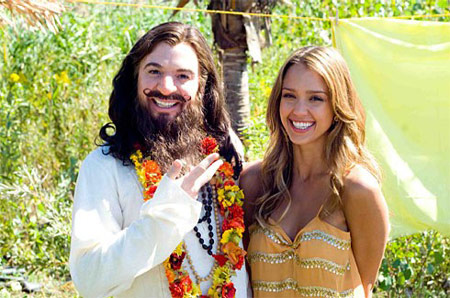You Don’t Mess With the Zohan
Posted on October 7, 2008 at 8:00 am
Somewhere inside this Adam Sandler slacker silliness there is a fierce and provocative little satire trying to get out. Sandler is so busy with his usual shtick that at times it seems that even he hardly notices the subversive political humor bubbling up around him.
Sandler plays Zohan, a top Israeli assassin, who can slaughter terrorists with one hand while he scoops hummus with the other. He is commando as rock star, universally admired and adored by all women. But Zohan dreams of peace and hairdressing. He decides to fake his own death and move to the United States where he can spend his days making hair shiny and silky. Soon he has transformed himself with an 80’s haircut and has a job sweeping up hair in a beauty salon on the Palestinian side of the street in a middle Eastern neighborhood of New York and is happily having sex with all of the elderly patrons and his landlady (all-purpose ethnic hot mama Lainie Kazan).
Comedians most often rely on ineptitude at work or with women to get laughs, but Sandler’s characters are often very successful in both. That leaves only gross-outs and silliness for humor, and that is what Sandler gives us, over and over. Lots of jokes about sex with old ladies (who are all thrilled with his prowess), bare tushes (male and female), the consternation of his landlady’s nerdy son over his mother’s unabashed sexual encounters, the ability to withstand pain, made-up euphemisms for sex, random pop star cameos, and of course one of Sandler’s theme moves — a sharp implement being thrust into the body of someone who feels no pain. We’ve seen most of this before.
But the movie also has moments of surreal humor, some remarkably adept and surprisingly understated political satire, and better roles than usual for Sandler’s frequent co-stars John Turturro and Rob Schneider. Its (almost) even-handed jibes at just about everyone are refreshing. Of course the real bad guy is a white American, but the movie’s notion that this is a place where people may hate and do crazy things but they can all agree on the importance of shiny hair, good Chinese food, and the other things that really matter in life is sweetly hopeful. All the crotch-rubbing and hummus humor feels tired and shrill when we see would-be terrorists put on hold from the bomb-building line, cheerfully reassured by the recorded voice that “we will resume service as soon as negotiations break down” or a bunch of enemies interrupting a confrontation to speculate on the, uh, appeal of Hillary Clinton.
The outrageous stereotyping and stereotype tweaking of characters on the basis of race, culture, religion, and nationality may be softened or even sanitized by the content that falls into the “normally offensive” category, the stereotyping and stereotype tweaking of old ladies (sexually voracious or addled, often both), the constant vulgarity, Sandler’s annoying idea of an accent. Or it may be that it is just a distraction that lets the political satire sneak in under the radar. But this glimpse of something a little more ambitious, a little more substantive adds a level of freshness and interest that is a welcome change from Sandler’s increasingly stale snigger-fests.

 In his last live action movie Mike Myers played three characters and two of them, the grossly obese and just plain gross Fat Bastard and even the title character, ever-ready-to-party Austin Powers, were one-joke concepts. Myers and the film were best when the focus was on the villainous Dr. Evil. In his latest film, “The Love Guru,” Myers only plays one character but he is the least interesting figure in the movie, or at least the least interesting male. The wonderfully talented Meagan Good and the appealing Jessica Alba have nothing to do but gaze adoringly at whichever male the script asks them to, which they do reasonably well, and look very, very fetching, which they do extremely well. Meanwhile, Myers’ character, the Guru Pitka, has a beard that obscures much of his face and a storyline that underneath all of the gross-out humor is just dull.
In his last live action movie Mike Myers played three characters and two of them, the grossly obese and just plain gross Fat Bastard and even the title character, ever-ready-to-party Austin Powers, were one-joke concepts. Myers and the film were best when the focus was on the villainous Dr. Evil. In his latest film, “The Love Guru,” Myers only plays one character but he is the least interesting figure in the movie, or at least the least interesting male. The wonderfully talented Meagan Good and the appealing Jessica Alba have nothing to do but gaze adoringly at whichever male the script asks them to, which they do reasonably well, and look very, very fetching, which they do extremely well. Meanwhile, Myers’ character, the Guru Pitka, has a beard that obscures much of his face and a storyline that underneath all of the gross-out humor is just dull.